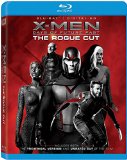| Reviews & Columns |
|
Reviews DVD TV on DVD Blu-ray 4K UHD International DVDs In Theaters Reviews by Studio Video Games Features Collector Series DVDs Easter Egg Database Interviews DVD Talk Radio Feature Articles Columns Anime Talk DVD Savant Horror DVDs The M.O.D. Squad Art House HD Talk Silent DVD
|
DVD Talk Forum |
|
|
| Resources |
|
DVD Price Search Customer Service #'s RCE Info Links |
|
Columns
|
|
|
X-Men: Days of Future Past -- The Rogue Cut
Fox // PG-13 // July 14, 2015
List Price: $29.99 [Buy now and save at Amazon]
The Film:
Brisk pacing, teamwork, and the gray-area motivations of antagonists are some of the big benchmarks of Bryan Singer's first two X-Men films, the first of which recently celebrated the fifteenth anniversary of its theatrical debut. These strengths commanded enough attention to begin the revival of the comic-book subgenre into the thriving pop-culture machine it's become, for better and for worse, so it naturally came as a blow when Singer pulled out the third installment, the now much-maligned X-Men: The Last Stand, in pursuit of ... well,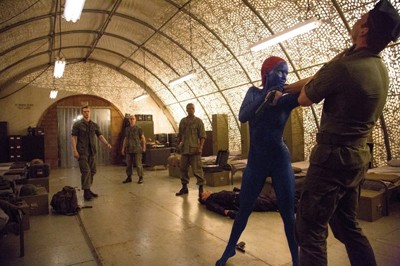 you know,
you know, someone something else. A desire for a follow-up to Matthew Vaughn's rebooting of the universe in X:Men: First Class opened the door for the chance to right some of those wrongs, evolving into a take on a two-issue comic story from the '80s, "Days of Future Past", deliberately built to circumvent future events that lead the universe down a dismal course. With Singer retaking the reins, which he does as a director with a darker sensibility and a less heavy-handed perspective on diversity, what results is a vigorous and consequential tabula rasa for the X-Men franchise.
Look, Days of Future Past is a comic-book movie through and through. Even within a universe involving an energy wave that transforms humans to mutants and a mind-control serum that can send mutants to do whatever someone pleases, sending a consciousness back roughly fifty years into their younger body crosses most of the franchise's remaining lines of "groundedness". As with most things, however, it depends on how the writers use those devices, and the idea of desperately changing the past to prevent the dystopian future first depicted in the film -- one of mutant mass killings and concentration camps -- justifies that element. Only instead of Kitty Pryde (Ellen Page) transporting back to the '70s, to the origin point of this perception of mutants after a murder carried out by Mystique (Jennifer Lawrence) on a prominent human scientist, Bolivar Trask (Peter Dinklage), it's the enduring face of the franchise, the self-healing and gristly Wolverine (Hugh Jackman), who travels back into his younger form with her aid to persuade Charles Xavier (James McAvoy) and Erik "Magneto" Lehnsherr (Michael Fassbender) to help prevent this war between species from ever happening ... by stopping their old friend and comrade.
Penned largely by Last Stand writer/producer Simon Kinberg, who himself has claimed that mistakes needed to be made right in the cinematic X-Men universe, Days of Future Past establishes a bleak pathway for the future of mutants in a way that gets everyone up to speed without absolutely needing a refresher on either Singer's X-Men mythology or Vaughn's retooled origin story in First Class. Naturally, it helps to have those previous installments for an emotional foundation, especially in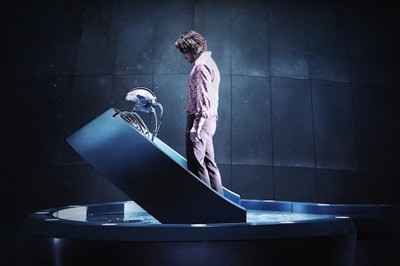 the complicated relationship between the young iterations of Xavier, Erik, and Mystique in the aftermath of events that sent them in diverging ideological directions. Singer gives the audience almost all the tools they need without relying on those previous films like a sequel crutch, though, from quick flashbacks to emotional reunions and a clear emphasis on the reason that humanity's war against mutants -- driven by near-invincible murder machines, called sentinels -- came about. Balancing all those components proves to be a tricky endeavor; however, Singer and his writers are not only up to the task, but embrace the opportunity.
the complicated relationship between the young iterations of Xavier, Erik, and Mystique in the aftermath of events that sent them in diverging ideological directions. Singer gives the audience almost all the tools they need without relying on those previous films like a sequel crutch, though, from quick flashbacks to emotional reunions and a clear emphasis on the reason that humanity's war against mutants -- driven by near-invincible murder machines, called sentinels -- came about. Balancing all those components proves to be a tricky endeavor; however, Singer and his writers are not only up to the task, but embrace the opportunity.
Similar to what Vaughn -- also one of the story's writers -- accomplished in First Class by involving mutants in the events of the '60s Cuba conflict, Days of Future Past smartly uses the Vietnam War-era setting to propel the story's momentum and deepen the characters through the time-travel. Hugh Jackman's vascular, charismatically grumpy turn as Logan flexes some more pensive muscle as a version of the character burdened by heavy losses and the rigors of a genocidal war against undefeatable foes, while James McAvoy embodies a wayward, self-medicating iteration of Professor X who's lost even more after the events in Cuba during his era's own static conflict. Against the backdrop of wartime protests and the fear-mongering involved with preventing further casualties with militaristic control, the layers involved with the story's ten-year progression in time weave together with a burgeoning dread of what mutants could do if unchecked. That ties into the pervasive theme of fearing the abnormal from Singer's older X-Men films, only not nearly as on-the-nose in its allegory to modern diversity struggles.
Nitpicks are to be found in Days of Future Past, naturally, hiccups in logic within the numerous superpowers and the time-traveling, but director Singer orchestrates the crossing paths and grandiose set-pieces with a real appreciation for the scope, wonder, and danger behind the mutants' abilities. He brings back cinematographer Newton Thomas Sigel to recapture the expressive visual language and kinetic energy of the first two films, juxtaposing the future's desolate atmosphere of purple neon and shadowy cobalt blue with the warmth and gravitas of the '70s.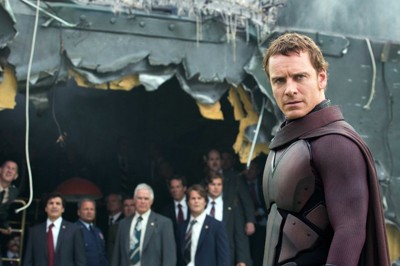 Immersive computer-generated effects involving the morphing, relentless forces of the sentinels and the malleable powers of Michael Fassbender's dark-gray machinations as Magneto provide many stunning displays of prowess, while a gleefully outlandish sequence featuring Evan Peters as the lightning-fast Quicksilver almost steals the show, brilliantly using slow-motion and particle effects. The action at work here isn't just a rehash of previous films, either: Singer and his writers explore clever, menacing uses for the mutants' powers, from controlling bullets to creating teleportation portals and blasting aircraft in the sky.
Immersive computer-generated effects involving the morphing, relentless forces of the sentinels and the malleable powers of Michael Fassbender's dark-gray machinations as Magneto provide many stunning displays of prowess, while a gleefully outlandish sequence featuring Evan Peters as the lightning-fast Quicksilver almost steals the show, brilliantly using slow-motion and particle effects. The action at work here isn't just a rehash of previous films, either: Singer and his writers explore clever, menacing uses for the mutants' powers, from controlling bullets to creating teleportation portals and blasting aircraft in the sky.
A vigorous, inspired hybrid of superhuman subterfuge and blockbuster spectacle takes shape, but Singer also understands the core of what really ups the stakes in Days of Future Past: the melancholy tipping points between defeat and victory, hinged on the determination of the characters to forge a better future and the ability to empathize with why certain villains might do what they do. Very little disposable content emerges in its two-hour rush against the clock, where every explosion and brush with danger crafts an intelligently bittersweet tone, centered on the irreconcilable clash over the next steps for mutants in society -- cooperative or domineering -- as Logan's window of opportunity nears its close. To be expected from time-travel movies of this type, nothing remains the same once the events in the past take hold, forcing an alternate universe into existence following an uproarious, crowd-pleasing ending. There's no telling where things might head with zero baggage and endless opportunities to explore untapped potential, something Singer affords the X-Men franchise in his triumphant return.
The Rogue Cut (Spoilers):
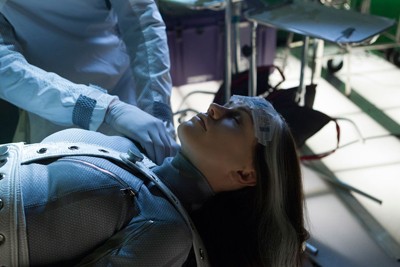 Eagle-eyed fans of the film and of the X-Men franchise were quick to point out a discrepancy between the trailers and the final Days of Future Past product: some content revolving around the character of Rogue, reprised by Anna Paquin, seemed to have been lost in the shuffle. Interviews after the release (namely this one at Empire) indicated that a chunk of over ten minutes of content was cut to improve pacing and tighten storytelling, which resulted in the complete removal of one of the core characters in the series -- the most significant mutant in the original film's plot, actually -- aside from a hazy glimpse at her at the very end. Demand grew to see the content reintegrated into the film, and the moniker "Rogue Cut" slowly took shape on social media and in online discussions. As a sly way of commemorating the anniversary of the first film's theatrical release, Bryan Singer formally announced the release of Days of Future Past: The Rogue Cut in a broadcast from the set of X-Men: Apocalypse, later detailed to include not just the missing scene into a new cut, but other missing pieces and a slate of new extras. Was the wait worth it?
Eagle-eyed fans of the film and of the X-Men franchise were quick to point out a discrepancy between the trailers and the final Days of Future Past product: some content revolving around the character of Rogue, reprised by Anna Paquin, seemed to have been lost in the shuffle. Interviews after the release (namely this one at Empire) indicated that a chunk of over ten minutes of content was cut to improve pacing and tighten storytelling, which resulted in the complete removal of one of the core characters in the series -- the most significant mutant in the original film's plot, actually -- aside from a hazy glimpse at her at the very end. Demand grew to see the content reintegrated into the film, and the moniker "Rogue Cut" slowly took shape on social media and in online discussions. As a sly way of commemorating the anniversary of the first film's theatrical release, Bryan Singer formally announced the release of Days of Future Past: The Rogue Cut in a broadcast from the set of X-Men: Apocalypse, later detailed to include not just the missing scene into a new cut, but other missing pieces and a slate of new extras. Was the wait worth it?
The Rogue Cut actually totals right at seventeen (17) minutes longer than the theatrical cut of Days of Future Past, expanded from 2:11:35 to 2:28:45, mostly centered on the deleted Rogue sequence with the remaining new content bits sprinkled throughout the film: trimmed conversations, small plot devices, and mildly extended action sequences. Heavier spoilers follow. These additions range from negligible, debatable improvements (such as showing how the sentinels found the mutants' location near the end of the film) to meaty character bits involving the future mutants' debate and vote over whether to partake in the time-travel plan, the deeper relationship between Kitty Pryde and "Iceman" Bobby (Rogue's ex), and how/when Hank brings up his mortality and fate to Logan. Mystique's bee-lining to Xavier's mansion before departing to Washington D.C. is perhaps the biggest of the new non-Rogue bits: while not accomplishing much in the plot itself, it manages to soften Mystique's character and resolve leading into the ending, which can be both a benefit to the emotional tempo and a weakness depending on how you view her character arc there. The new tidbits are hit and miss, but are harmless, mostly unobtrusive additions that fans should enjoy.
Then, there's the new Rogue content, the star of the show in this alternate cut of Days of Future Past. Remember the uninterrupted scene involving Erik reclaiming his helmet through the broken glass? Well, that was originally edited in snippets within a sequence featuring future Magneto infiltrating Xavier's mansion, an area occupied by Trask loyalists who have been experimenting on mutants, notably Rogue. The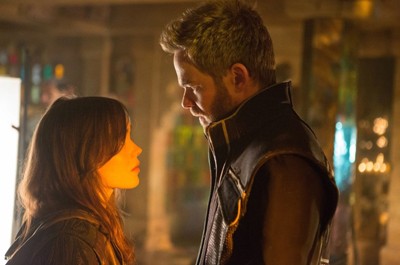 entire sequence involves Magneto and Iceman sneaking in and getting Rogue out, hoping to replace an injured Kitty Pryde with her due to her power-siphoning abilities. It gives both Magneto and Professor X (who pilots them there) a little something extra to do in the film, and, of course, bringing Rogue into the fold adds some reference to the original film, essentially accomplishing the reverse of what her power was used for there: preventing an antagonistic agenda instead of facilitating one.
entire sequence involves Magneto and Iceman sneaking in and getting Rogue out, hoping to replace an injured Kitty Pryde with her due to her power-siphoning abilities. It gives both Magneto and Professor X (who pilots them there) a little something extra to do in the film, and, of course, bringing Rogue into the fold adds some reference to the original film, essentially accomplishing the reverse of what her power was used for there: preventing an antagonistic agenda instead of facilitating one.
Frankly, however, I agree with the writers here: this diversion of a sequence detracts more from the strengths of Days of Future Past than it accomplishes, tinkering with the pace, the tone, and some of the script's brainpower. Questions pile up about both Rogue's location and the relative ease in which she's extracted, as well as how she's able to effortlessly take over for Kitty Pryde considering the focus required to keep Logan locked in on the '70s. It also mucks with the relationship growth between Kitty and Iceman due to certain other events that transpire (though one could also argue that it makes the tone more harrowing before this continuity gets wiped clean), and detracts from the urgency of Kitty's wounds as the sentinels approach. Interestingly, this cut of the film really does accomplish all the same objectives, having new answers for things depending on the script differences -- Kitty now does something else during the final sentinel battle -- and superfluous answers for things that really didn't need them. End spoilers.
The Rogue Cut ends up being a worthwhile alternate version; however, it's not my preferred cut, nostalgia and all.
The Blu-ray:
Whether you prefer the theatrical cut or Bryan Singer's new Rogue Cut really doesn't matter all that much when it comes to Fox Home Entertainment's new Blu-ray presentation of X-Men: Days of Future Past: both cuts are available via seamless branching on the first disc in this set, a standard two-disc presentation with garish red and black design elements that should remind fans of the old X-Men 1.5 DVD set. Everything on the inside is standard fare, including instructions for the Second Screen app and a Digital Copy Slip for the Rogue Cut; however, Fox have been good enough to add a little flair to the set with a gate-fold slipcover, held together with a plastic velcro disc and featuring holographic red elements that carry over to the inner design. All the non-commentary extras appear on Disc Two. Keep in mind that The Rogue Cut only comes in 2D presentations, instead of the original 3D/2D combo released last year.
Video and Audio:
Listen, I'm about to dance around the difference between "flawless" and "terrific" here, so long story short? Both Blu-ray presentations of Days of Future Past are well worth seeking out, as the polished, colorful, incredibly-detailed blockbuster looks and sounds stunning in high-definition. That being said, The Rogue Cut does take a slight hit in the fidelity department here. While the 2.39:1-framed, 1080p AVC encode still does everything a lot of justice, the strength of clarity and digital presence are slightly weaker than the previous release. Black levels in certain scenes err a little lighter and greener than the previous disc, while motion has a noticeably smoother and less-solid flow to it in spots. The bitrate dips here and there, too, and a key area to monitor this is during Quicksilver's room-spinning spectacle: numerous frames during that scene reached over 30mbps before, yet the same frames in the branched Rogue Cut only get to around 25-28mbps. Again, we're splitting hairs here: the blasts of neon and kaleidoscope stained-glass shades in the "sanctum" are vivid, skin tones -- both blue and fleshy -- are convincing and respond well to lighting, fine details in the futuristic outfits and '70s attire are razor-sharp, and contrast always remains rich yet unobtrusive. It's just a step down.
Similar things can be said for the 7.1 DTS-HD Master Audio track: what was a sonic beast in the first presentation remains an aggressive sonic beast on this disc, only with a few stumbles that accentuate forgivable flaws from before. Surround activity across the entire soundstage remains incredibly immersive, relentlessly using bold action effects, atmospheric touches surrounding the Vietnam campsite and the disco, and Ottman's blend of energetic and stirring music to fill the area. Clanking, bending metal at the hands of Magneto, Blink's portal creation, and a fierce explosion following a precise thunderbolt strike all hit the mid-range and bass arenas with a lot of vigor, while subtle effects like Mystique's transformation flutters and the slosh of a waterbed are satisfyingly pronounced. Verbal clarity is, for the most part, well-balanced and clear; however, some sequences that were a tad muffled in the previous track tend to be even thinner and harder to discern here (Wolverine and Hank's first meeting, for one example), though you never really lose the conversation at all. And some of the thuds on hardwood floor and shattered glass that were merely suitable before are a little duller this time around. Days of Future Past still sound terrific and quite a distance ahead of most tracks, just not as close to perfection as the previous treatment. English and Spanish subs are available, along with Spanish and French 5.1 tracks.
Special Features:
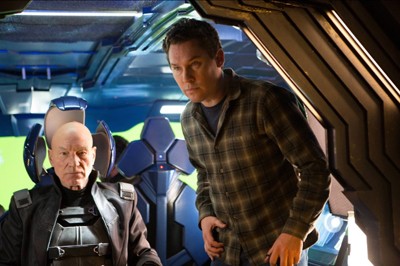 The gloves come off in the Audio Commentary with Bryan Singer and John Ottman for the Rogue Cut, which gets its hands dirty with abandoned ideas, goofy easter eggs, and, above all else, discussion about the elements that were reincorporated. Bryan Singer tends to be the more diplomatic of the two, largely straying away from bluntness about their decisions, but composer/editor John Ottman's candidness is a refreshing counterbalance to that. They're all about tackling the sacrifices and weaknesses involving elements that were cut, and they don't really pull punches when discussing the bigger additions, ragging on the teen-drama feel of the Mystique-Beast romance segment and the head-scratcher logic of the Rogue scene. The best moments, however, come when they discuss the stuff that stayed out of both cuts entirey, from alternate music that played overseas to an exposition scene dependent on Professor X's wheelchair. There are silent gaps, typically when they're not near any of the new material, but Singer and Ottman's commentary really works when they're there.
The gloves come off in the Audio Commentary with Bryan Singer and John Ottman for the Rogue Cut, which gets its hands dirty with abandoned ideas, goofy easter eggs, and, above all else, discussion about the elements that were reincorporated. Bryan Singer tends to be the more diplomatic of the two, largely straying away from bluntness about their decisions, but composer/editor John Ottman's candidness is a refreshing counterbalance to that. They're all about tackling the sacrifices and weaknesses involving elements that were cut, and they don't really pull punches when discussing the bigger additions, ragging on the teen-drama feel of the Mystique-Beast romance segment and the head-scratcher logic of the Rogue scene. The best moments, however, come when they discuss the stuff that stayed out of both cuts entirey, from alternate music that played overseas to an exposition scene dependent on Professor X's wheelchair. There are silent gaps, typically when they're not near any of the new material, but Singer and Ottman's commentary really works when they're there.
A second Audio Commentary with Bryan Singer and Simon Kinberg accompanies the theatrical cut of the film. While there's more consistent involvement from the writer-director duo, there's also lot of redundant content mentioned throughout the piece, touching again on the re-recorded scoring elements, placing emphasis on F-bombs, and the stuff removed that was reintegrated into the Rogue Cut. There are divergences, of course, that make this track worth listening to: Singer discusses the challenges of managing production elements on a larger, but not infinite, budget; he touches on Lawrence's Vietnamese and dedication to the physicality of Mystique; and, interestingly, the pair discuss how the film's script took shape, where apparently they were cooking up the idea of time-travel before even considering the Days of Future Past narrative from the comics. Again, a lot of content does get retread between both commentaries that makes it a bit of a drag to listen to whatever one ends up second, but they're both solid in their own regard, and this one in particular alludes to ideas coming in the next movie.
Mutant vs. Machine (52:41, 16x9 HD) starts out looking like a relatively standard collection of press-kit interviews and behind-the-scenes material, but it gradually becomes obvious that the widespread participation of the filmmakers, actors, and other personalities involved takes it to another level. Singer and Kinberg touch on the origin of the Days of Future Past narrative as a way fusing the classic X-Men cinematic universe with the First Class one, accompanied by interview bits with the series' comic writers, which branches into discussion about focusing on Wolverine as the temporally transported character and Bolivar Trask as the death that puts everything in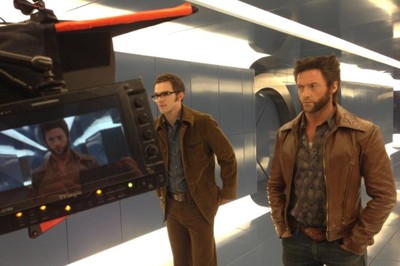 motion, enhanced by interviews with Hugh Jackman, Peter Dinklage, and others. Discussion then moves to bringing the whole band back together, both the cast and the production crew. Yeah, you'll spot some cursory interview time with Anna Paquin early on; however, that's ultimately not as interesting as listening to Jackman frankly acknowledge the significance of X-Men to his career, hearing about weathering the costumes and the difficulty of making Professor X's appearance, seeing Evan Peters getting hit with blowing air and the intricacy of Fan Bingbing's attire, the geometry and tone of Erik's prison and the stained-glass "inner sanctum", and the difficulties of shooting in 3D (which might sting for those who were hoping for a 3D release of the Rogue Cut). And then, yes, the next-to-last chapter of this piece focuses directly on the excited Rogue content for around three minutes, how shooting it early and devising it as a subplot made it relatively painless to remove from the narrative. Great making-of featurette with fantastic behind-the-scene glimpses, capped off with some vague info about where they're headed for X-Men: Apocalypse.
motion, enhanced by interviews with Hugh Jackman, Peter Dinklage, and others. Discussion then moves to bringing the whole band back together, both the cast and the production crew. Yeah, you'll spot some cursory interview time with Anna Paquin early on; however, that's ultimately not as interesting as listening to Jackman frankly acknowledge the significance of X-Men to his career, hearing about weathering the costumes and the difficulty of making Professor X's appearance, seeing Evan Peters getting hit with blowing air and the intricacy of Fan Bingbing's attire, the geometry and tone of Erik's prison and the stained-glass "inner sanctum", and the difficulties of shooting in 3D (which might sting for those who were hoping for a 3D release of the Rogue Cut). And then, yes, the next-to-last chapter of this piece focuses directly on the excited Rogue content for around three minutes, how shooting it early and devising it as a subplot made it relatively painless to remove from the narrative. Great making-of featurette with fantastic behind-the-scene glimpses, capped off with some vague info about where they're headed for X-Men: Apocalypse.
Seeming as if it were shot sometime before the film's release based on their reservation in divulging plot details, X-Men: Unguarded (30:11, 16x9 HD) brings together a huge portion of the cast for a casual roundtable discussion about their experiences with the franchise. The tone created between them and the editing is honest, unrestrained, and enjoyable to watch. Certain cast members discuss their lack of comic-book knowledge leading into their respective filmmaking experiences, while the topic of allegory in the franchise -- social ostracizing -- comes up rather quickly. They also touch on their awareness of the fans' responses, both positive and negative, to creative decisions and ties to the books, as well as some neat individual stories: what it was like for the two Xaviers to interact, how Fassbender got acclimated to Ian McKellan's speech, and what it was like for Singer to get back in the director's chair. Again, similar topics are brought up from the commentaries and the featurette, but getting the actors' individual responses to those things adds depth to the equation. Fox Home Entertainment have also included a series of still-image Galleries (HD) -- for Storyboards, Costumes, and Concept Art -- that can be cycles with an auto-advance feature.
Can fans ditch their original theatrical cut Blu-rays of Days of Future Past?... eh, not really, no. In making this new set worthwhile, Fox Home Entertainment have kept the extras entirely diverse between the two releases, directly repeating none of them. That means, just to refresh memories: the Deleted Scenes (none of which show up in the Rogue Cut), the abandoned and slightly gag-reelish Kitchen Sequence, the really strong Double Take: Xavier and Magneto featurette (filled with interviews and green-screen shots), the somewhat redundant X-Men Reunited featurette (aside from a few exclusive interview participants), the Classification: M featurette that more directly emphasized the new mutants, the Sentinels: For a Secure Future exploration of the iconic robots from the comics, the Trask Industry Gallery, and the Gag Reel and Trailers are nowhere to be found. That's over an hour of really solid stuff that offers more concentrated glimpses into topics superficially touched on in the Rogue Cut features, so, for completionists and enthusiasts, I'd recommend Frankenstein-ing a custom set with the two new discs and the prior theatrical Blu-ray, especially since the older disc has an edge in technical prowess for the original cut.
Final Thoughts:
Flaws notwithstanding, Days of Future Past comes about as close to a gift-wrapped apology for the direction taken by the X-Men franchise without actually admitting as such, accomplishing quite a bit in its thrilling, polished, and emotionally gripping leap back in time. For one, it brings together most of the old and new characters into one narrative for a justified, rewarding reason that calls back to the comics, which also presents Bryan Singer a fitting opening to return to the universe in a directorial capacity. More than that, the film's design is built on the idea of creating a new continuity, wiping the slate clean in a big, exciting way so that even more X-Men stories can be told involving these individuals and their dynamics in an undefined chronology. Even if none of that really matters to who's watching, there's still quite a bit to embrace on the surface with the bleakness of the stakes, the visual panache, and the relentlessness of the action Singer and his team orchestrate, easily making it one of 2014's best blockbusters.
That original experience has been replicated in full on this double-dipped Blu-ray, but that's clearly not the draw to "The Rogue Cut" of Days of Future Past, an alternate version of the film with little added extensions throughout the film and a significant chunk of material that reintegrates one the series' iconic characters, Rogue, back into the narrative. Whether it's better or worse will depend on the individual, a testament both to the seamless reintegration of material and the spirit of what's there; however, personally, I still prefer the tighter journey offered in the theatrical edition. Fans get the best of both worlds through this Blu-ray, though, with the option to watch either one via seamless branching and a host of new extras to explore, including commentaries and a nearly hour-long featurette. Highly Recommended.
Thomas Spurlin, Staff Reviewer -- DVDTalk Reviews | Personal Blog/Site
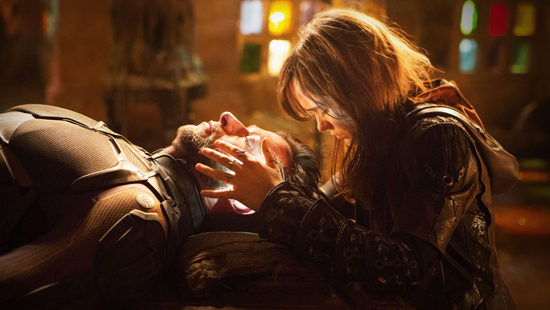 |
Brisk pacing, teamwork, and the gray-area motivations of antagonists are some of the big benchmarks of Bryan Singer's first two X-Men films, the first of which recently celebrated the fifteenth anniversary of its theatrical debut. These strengths commanded enough attention to begin the revival of the comic-book subgenre into the thriving pop-culture machine it's become, for better and for worse, so it naturally came as a blow when Singer pulled out the third installment, the now much-maligned X-Men: The Last Stand, in pursuit of ... well,
 you know,
you know, Look, Days of Future Past is a comic-book movie through and through. Even within a universe involving an energy wave that transforms humans to mutants and a mind-control serum that can send mutants to do whatever someone pleases, sending a consciousness back roughly fifty years into their younger body crosses most of the franchise's remaining lines of "groundedness". As with most things, however, it depends on how the writers use those devices, and the idea of desperately changing the past to prevent the dystopian future first depicted in the film -- one of mutant mass killings and concentration camps -- justifies that element. Only instead of Kitty Pryde (Ellen Page) transporting back to the '70s, to the origin point of this perception of mutants after a murder carried out by Mystique (Jennifer Lawrence) on a prominent human scientist, Bolivar Trask (Peter Dinklage), it's the enduring face of the franchise, the self-healing and gristly Wolverine (Hugh Jackman), who travels back into his younger form with her aid to persuade Charles Xavier (James McAvoy) and Erik "Magneto" Lehnsherr (Michael Fassbender) to help prevent this war between species from ever happening ... by stopping their old friend and comrade.
Penned largely by Last Stand writer/producer Simon Kinberg, who himself has claimed that mistakes needed to be made right in the cinematic X-Men universe, Days of Future Past establishes a bleak pathway for the future of mutants in a way that gets everyone up to speed without absolutely needing a refresher on either Singer's X-Men mythology or Vaughn's retooled origin story in First Class. Naturally, it helps to have those previous installments for an emotional foundation, especially in
 the complicated relationship between the young iterations of Xavier, Erik, and Mystique in the aftermath of events that sent them in diverging ideological directions. Singer gives the audience almost all the tools they need without relying on those previous films like a sequel crutch, though, from quick flashbacks to emotional reunions and a clear emphasis on the reason that humanity's war against mutants -- driven by near-invincible murder machines, called sentinels -- came about. Balancing all those components proves to be a tricky endeavor; however, Singer and his writers are not only up to the task, but embrace the opportunity.
the complicated relationship between the young iterations of Xavier, Erik, and Mystique in the aftermath of events that sent them in diverging ideological directions. Singer gives the audience almost all the tools they need without relying on those previous films like a sequel crutch, though, from quick flashbacks to emotional reunions and a clear emphasis on the reason that humanity's war against mutants -- driven by near-invincible murder machines, called sentinels -- came about. Balancing all those components proves to be a tricky endeavor; however, Singer and his writers are not only up to the task, but embrace the opportunity. Similar to what Vaughn -- also one of the story's writers -- accomplished in First Class by involving mutants in the events of the '60s Cuba conflict, Days of Future Past smartly uses the Vietnam War-era setting to propel the story's momentum and deepen the characters through the time-travel. Hugh Jackman's vascular, charismatically grumpy turn as Logan flexes some more pensive muscle as a version of the character burdened by heavy losses and the rigors of a genocidal war against undefeatable foes, while James McAvoy embodies a wayward, self-medicating iteration of Professor X who's lost even more after the events in Cuba during his era's own static conflict. Against the backdrop of wartime protests and the fear-mongering involved with preventing further casualties with militaristic control, the layers involved with the story's ten-year progression in time weave together with a burgeoning dread of what mutants could do if unchecked. That ties into the pervasive theme of fearing the abnormal from Singer's older X-Men films, only not nearly as on-the-nose in its allegory to modern diversity struggles.
Nitpicks are to be found in Days of Future Past, naturally, hiccups in logic within the numerous superpowers and the time-traveling, but director Singer orchestrates the crossing paths and grandiose set-pieces with a real appreciation for the scope, wonder, and danger behind the mutants' abilities. He brings back cinematographer Newton Thomas Sigel to recapture the expressive visual language and kinetic energy of the first two films, juxtaposing the future's desolate atmosphere of purple neon and shadowy cobalt blue with the warmth and gravitas of the '70s.
 Immersive computer-generated effects involving the morphing, relentless forces of the sentinels and the malleable powers of Michael Fassbender's dark-gray machinations as Magneto provide many stunning displays of prowess, while a gleefully outlandish sequence featuring Evan Peters as the lightning-fast Quicksilver almost steals the show, brilliantly using slow-motion and particle effects. The action at work here isn't just a rehash of previous films, either: Singer and his writers explore clever, menacing uses for the mutants' powers, from controlling bullets to creating teleportation portals and blasting aircraft in the sky.
Immersive computer-generated effects involving the morphing, relentless forces of the sentinels and the malleable powers of Michael Fassbender's dark-gray machinations as Magneto provide many stunning displays of prowess, while a gleefully outlandish sequence featuring Evan Peters as the lightning-fast Quicksilver almost steals the show, brilliantly using slow-motion and particle effects. The action at work here isn't just a rehash of previous films, either: Singer and his writers explore clever, menacing uses for the mutants' powers, from controlling bullets to creating teleportation portals and blasting aircraft in the sky. A vigorous, inspired hybrid of superhuman subterfuge and blockbuster spectacle takes shape, but Singer also understands the core of what really ups the stakes in Days of Future Past: the melancholy tipping points between defeat and victory, hinged on the determination of the characters to forge a better future and the ability to empathize with why certain villains might do what they do. Very little disposable content emerges in its two-hour rush against the clock, where every explosion and brush with danger crafts an intelligently bittersweet tone, centered on the irreconcilable clash over the next steps for mutants in society -- cooperative or domineering -- as Logan's window of opportunity nears its close. To be expected from time-travel movies of this type, nothing remains the same once the events in the past take hold, forcing an alternate universe into existence following an uproarious, crowd-pleasing ending. There's no telling where things might head with zero baggage and endless opportunities to explore untapped potential, something Singer affords the X-Men franchise in his triumphant return.
The Rogue Cut (Spoilers):
 Eagle-eyed fans of the film and of the X-Men franchise were quick to point out a discrepancy between the trailers and the final Days of Future Past product: some content revolving around the character of Rogue, reprised by Anna Paquin, seemed to have been lost in the shuffle. Interviews after the release (namely this one at Empire) indicated that a chunk of over ten minutes of content was cut to improve pacing and tighten storytelling, which resulted in the complete removal of one of the core characters in the series -- the most significant mutant in the original film's plot, actually -- aside from a hazy glimpse at her at the very end. Demand grew to see the content reintegrated into the film, and the moniker "Rogue Cut" slowly took shape on social media and in online discussions. As a sly way of commemorating the anniversary of the first film's theatrical release, Bryan Singer formally announced the release of Days of Future Past: The Rogue Cut in a broadcast from the set of X-Men: Apocalypse, later detailed to include not just the missing scene into a new cut, but other missing pieces and a slate of new extras. Was the wait worth it?
Eagle-eyed fans of the film and of the X-Men franchise were quick to point out a discrepancy between the trailers and the final Days of Future Past product: some content revolving around the character of Rogue, reprised by Anna Paquin, seemed to have been lost in the shuffle. Interviews after the release (namely this one at Empire) indicated that a chunk of over ten minutes of content was cut to improve pacing and tighten storytelling, which resulted in the complete removal of one of the core characters in the series -- the most significant mutant in the original film's plot, actually -- aside from a hazy glimpse at her at the very end. Demand grew to see the content reintegrated into the film, and the moniker "Rogue Cut" slowly took shape on social media and in online discussions. As a sly way of commemorating the anniversary of the first film's theatrical release, Bryan Singer formally announced the release of Days of Future Past: The Rogue Cut in a broadcast from the set of X-Men: Apocalypse, later detailed to include not just the missing scene into a new cut, but other missing pieces and a slate of new extras. Was the wait worth it? The Rogue Cut actually totals right at seventeen (17) minutes longer than the theatrical cut of Days of Future Past, expanded from 2:11:35 to 2:28:45, mostly centered on the deleted Rogue sequence with the remaining new content bits sprinkled throughout the film: trimmed conversations, small plot devices, and mildly extended action sequences. Heavier spoilers follow. These additions range from negligible, debatable improvements (such as showing how the sentinels found the mutants' location near the end of the film) to meaty character bits involving the future mutants' debate and vote over whether to partake in the time-travel plan, the deeper relationship between Kitty Pryde and "Iceman" Bobby (Rogue's ex), and how/when Hank brings up his mortality and fate to Logan. Mystique's bee-lining to Xavier's mansion before departing to Washington D.C. is perhaps the biggest of the new non-Rogue bits: while not accomplishing much in the plot itself, it manages to soften Mystique's character and resolve leading into the ending, which can be both a benefit to the emotional tempo and a weakness depending on how you view her character arc there. The new tidbits are hit and miss, but are harmless, mostly unobtrusive additions that fans should enjoy.
Then, there's the new Rogue content, the star of the show in this alternate cut of Days of Future Past. Remember the uninterrupted scene involving Erik reclaiming his helmet through the broken glass? Well, that was originally edited in snippets within a sequence featuring future Magneto infiltrating Xavier's mansion, an area occupied by Trask loyalists who have been experimenting on mutants, notably Rogue. The
 entire sequence involves Magneto and Iceman sneaking in and getting Rogue out, hoping to replace an injured Kitty Pryde with her due to her power-siphoning abilities. It gives both Magneto and Professor X (who pilots them there) a little something extra to do in the film, and, of course, bringing Rogue into the fold adds some reference to the original film, essentially accomplishing the reverse of what her power was used for there: preventing an antagonistic agenda instead of facilitating one.
entire sequence involves Magneto and Iceman sneaking in and getting Rogue out, hoping to replace an injured Kitty Pryde with her due to her power-siphoning abilities. It gives both Magneto and Professor X (who pilots them there) a little something extra to do in the film, and, of course, bringing Rogue into the fold adds some reference to the original film, essentially accomplishing the reverse of what her power was used for there: preventing an antagonistic agenda instead of facilitating one. Frankly, however, I agree with the writers here: this diversion of a sequence detracts more from the strengths of Days of Future Past than it accomplishes, tinkering with the pace, the tone, and some of the script's brainpower. Questions pile up about both Rogue's location and the relative ease in which she's extracted, as well as how she's able to effortlessly take over for Kitty Pryde considering the focus required to keep Logan locked in on the '70s. It also mucks with the relationship growth between Kitty and Iceman due to certain other events that transpire (though one could also argue that it makes the tone more harrowing before this continuity gets wiped clean), and detracts from the urgency of Kitty's wounds as the sentinels approach. Interestingly, this cut of the film really does accomplish all the same objectives, having new answers for things depending on the script differences -- Kitty now does something else during the final sentinel battle -- and superfluous answers for things that really didn't need them. End spoilers.
The Rogue Cut ends up being a worthwhile alternate version; however, it's not my preferred cut, nostalgia and all.
The Blu-ray:
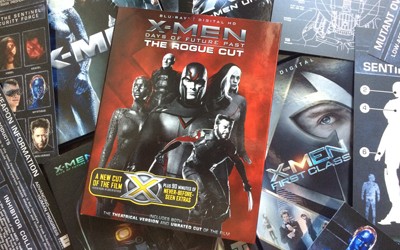 | 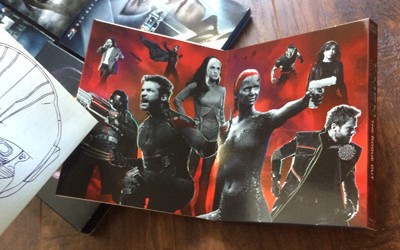 |
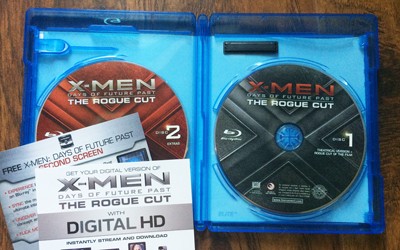 | 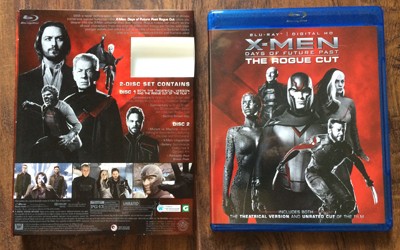 |
Whether you prefer the theatrical cut or Bryan Singer's new Rogue Cut really doesn't matter all that much when it comes to Fox Home Entertainment's new Blu-ray presentation of X-Men: Days of Future Past: both cuts are available via seamless branching on the first disc in this set, a standard two-disc presentation with garish red and black design elements that should remind fans of the old X-Men 1.5 DVD set. Everything on the inside is standard fare, including instructions for the Second Screen app and a Digital Copy Slip for the Rogue Cut; however, Fox have been good enough to add a little flair to the set with a gate-fold slipcover, held together with a plastic velcro disc and featuring holographic red elements that carry over to the inner design. All the non-commentary extras appear on Disc Two. Keep in mind that The Rogue Cut only comes in 2D presentations, instead of the original 3D/2D combo released last year.
Video and Audio:
Listen, I'm about to dance around the difference between "flawless" and "terrific" here, so long story short? Both Blu-ray presentations of Days of Future Past are well worth seeking out, as the polished, colorful, incredibly-detailed blockbuster looks and sounds stunning in high-definition. That being said, The Rogue Cut does take a slight hit in the fidelity department here. While the 2.39:1-framed, 1080p AVC encode still does everything a lot of justice, the strength of clarity and digital presence are slightly weaker than the previous release. Black levels in certain scenes err a little lighter and greener than the previous disc, while motion has a noticeably smoother and less-solid flow to it in spots. The bitrate dips here and there, too, and a key area to monitor this is during Quicksilver's room-spinning spectacle: numerous frames during that scene reached over 30mbps before, yet the same frames in the branched Rogue Cut only get to around 25-28mbps. Again, we're splitting hairs here: the blasts of neon and kaleidoscope stained-glass shades in the "sanctum" are vivid, skin tones -- both blue and fleshy -- are convincing and respond well to lighting, fine details in the futuristic outfits and '70s attire are razor-sharp, and contrast always remains rich yet unobtrusive. It's just a step down.
Similar things can be said for the 7.1 DTS-HD Master Audio track: what was a sonic beast in the first presentation remains an aggressive sonic beast on this disc, only with a few stumbles that accentuate forgivable flaws from before. Surround activity across the entire soundstage remains incredibly immersive, relentlessly using bold action effects, atmospheric touches surrounding the Vietnam campsite and the disco, and Ottman's blend of energetic and stirring music to fill the area. Clanking, bending metal at the hands of Magneto, Blink's portal creation, and a fierce explosion following a precise thunderbolt strike all hit the mid-range and bass arenas with a lot of vigor, while subtle effects like Mystique's transformation flutters and the slosh of a waterbed are satisfyingly pronounced. Verbal clarity is, for the most part, well-balanced and clear; however, some sequences that were a tad muffled in the previous track tend to be even thinner and harder to discern here (Wolverine and Hank's first meeting, for one example), though you never really lose the conversation at all. And some of the thuds on hardwood floor and shattered glass that were merely suitable before are a little duller this time around. Days of Future Past still sound terrific and quite a distance ahead of most tracks, just not as close to perfection as the previous treatment. English and Spanish subs are available, along with Spanish and French 5.1 tracks.
Special Features:
 The gloves come off in the Audio Commentary with Bryan Singer and John Ottman for the Rogue Cut, which gets its hands dirty with abandoned ideas, goofy easter eggs, and, above all else, discussion about the elements that were reincorporated. Bryan Singer tends to be the more diplomatic of the two, largely straying away from bluntness about their decisions, but composer/editor John Ottman's candidness is a refreshing counterbalance to that. They're all about tackling the sacrifices and weaknesses involving elements that were cut, and they don't really pull punches when discussing the bigger additions, ragging on the teen-drama feel of the Mystique-Beast romance segment and the head-scratcher logic of the Rogue scene. The best moments, however, come when they discuss the stuff that stayed out of both cuts entirey, from alternate music that played overseas to an exposition scene dependent on Professor X's wheelchair. There are silent gaps, typically when they're not near any of the new material, but Singer and Ottman's commentary really works when they're there.
The gloves come off in the Audio Commentary with Bryan Singer and John Ottman for the Rogue Cut, which gets its hands dirty with abandoned ideas, goofy easter eggs, and, above all else, discussion about the elements that were reincorporated. Bryan Singer tends to be the more diplomatic of the two, largely straying away from bluntness about their decisions, but composer/editor John Ottman's candidness is a refreshing counterbalance to that. They're all about tackling the sacrifices and weaknesses involving elements that were cut, and they don't really pull punches when discussing the bigger additions, ragging on the teen-drama feel of the Mystique-Beast romance segment and the head-scratcher logic of the Rogue scene. The best moments, however, come when they discuss the stuff that stayed out of both cuts entirey, from alternate music that played overseas to an exposition scene dependent on Professor X's wheelchair. There are silent gaps, typically when they're not near any of the new material, but Singer and Ottman's commentary really works when they're there. A second Audio Commentary with Bryan Singer and Simon Kinberg accompanies the theatrical cut of the film. While there's more consistent involvement from the writer-director duo, there's also lot of redundant content mentioned throughout the piece, touching again on the re-recorded scoring elements, placing emphasis on F-bombs, and the stuff removed that was reintegrated into the Rogue Cut. There are divergences, of course, that make this track worth listening to: Singer discusses the challenges of managing production elements on a larger, but not infinite, budget; he touches on Lawrence's Vietnamese and dedication to the physicality of Mystique; and, interestingly, the pair discuss how the film's script took shape, where apparently they were cooking up the idea of time-travel before even considering the Days of Future Past narrative from the comics. Again, a lot of content does get retread between both commentaries that makes it a bit of a drag to listen to whatever one ends up second, but they're both solid in their own regard, and this one in particular alludes to ideas coming in the next movie.
Mutant vs. Machine (52:41, 16x9 HD) starts out looking like a relatively standard collection of press-kit interviews and behind-the-scenes material, but it gradually becomes obvious that the widespread participation of the filmmakers, actors, and other personalities involved takes it to another level. Singer and Kinberg touch on the origin of the Days of Future Past narrative as a way fusing the classic X-Men cinematic universe with the First Class one, accompanied by interview bits with the series' comic writers, which branches into discussion about focusing on Wolverine as the temporally transported character and Bolivar Trask as the death that puts everything in
 motion, enhanced by interviews with Hugh Jackman, Peter Dinklage, and others. Discussion then moves to bringing the whole band back together, both the cast and the production crew. Yeah, you'll spot some cursory interview time with Anna Paquin early on; however, that's ultimately not as interesting as listening to Jackman frankly acknowledge the significance of X-Men to his career, hearing about weathering the costumes and the difficulty of making Professor X's appearance, seeing Evan Peters getting hit with blowing air and the intricacy of Fan Bingbing's attire, the geometry and tone of Erik's prison and the stained-glass "inner sanctum", and the difficulties of shooting in 3D (which might sting for those who were hoping for a 3D release of the Rogue Cut). And then, yes, the next-to-last chapter of this piece focuses directly on the excited Rogue content for around three minutes, how shooting it early and devising it as a subplot made it relatively painless to remove from the narrative. Great making-of featurette with fantastic behind-the-scene glimpses, capped off with some vague info about where they're headed for X-Men: Apocalypse.
motion, enhanced by interviews with Hugh Jackman, Peter Dinklage, and others. Discussion then moves to bringing the whole band back together, both the cast and the production crew. Yeah, you'll spot some cursory interview time with Anna Paquin early on; however, that's ultimately not as interesting as listening to Jackman frankly acknowledge the significance of X-Men to his career, hearing about weathering the costumes and the difficulty of making Professor X's appearance, seeing Evan Peters getting hit with blowing air and the intricacy of Fan Bingbing's attire, the geometry and tone of Erik's prison and the stained-glass "inner sanctum", and the difficulties of shooting in 3D (which might sting for those who were hoping for a 3D release of the Rogue Cut). And then, yes, the next-to-last chapter of this piece focuses directly on the excited Rogue content for around three minutes, how shooting it early and devising it as a subplot made it relatively painless to remove from the narrative. Great making-of featurette with fantastic behind-the-scene glimpses, capped off with some vague info about where they're headed for X-Men: Apocalypse. Seeming as if it were shot sometime before the film's release based on their reservation in divulging plot details, X-Men: Unguarded (30:11, 16x9 HD) brings together a huge portion of the cast for a casual roundtable discussion about their experiences with the franchise. The tone created between them and the editing is honest, unrestrained, and enjoyable to watch. Certain cast members discuss their lack of comic-book knowledge leading into their respective filmmaking experiences, while the topic of allegory in the franchise -- social ostracizing -- comes up rather quickly. They also touch on their awareness of the fans' responses, both positive and negative, to creative decisions and ties to the books, as well as some neat individual stories: what it was like for the two Xaviers to interact, how Fassbender got acclimated to Ian McKellan's speech, and what it was like for Singer to get back in the director's chair. Again, similar topics are brought up from the commentaries and the featurette, but getting the actors' individual responses to those things adds depth to the equation. Fox Home Entertainment have also included a series of still-image Galleries (HD) -- for Storyboards, Costumes, and Concept Art -- that can be cycles with an auto-advance feature.
Can fans ditch their original theatrical cut Blu-rays of Days of Future Past?... eh, not really, no. In making this new set worthwhile, Fox Home Entertainment have kept the extras entirely diverse between the two releases, directly repeating none of them. That means, just to refresh memories: the Deleted Scenes (none of which show up in the Rogue Cut), the abandoned and slightly gag-reelish Kitchen Sequence, the really strong Double Take: Xavier and Magneto featurette (filled with interviews and green-screen shots), the somewhat redundant X-Men Reunited featurette (aside from a few exclusive interview participants), the Classification: M featurette that more directly emphasized the new mutants, the Sentinels: For a Secure Future exploration of the iconic robots from the comics, the Trask Industry Gallery, and the Gag Reel and Trailers are nowhere to be found. That's over an hour of really solid stuff that offers more concentrated glimpses into topics superficially touched on in the Rogue Cut features, so, for completionists and enthusiasts, I'd recommend Frankenstein-ing a custom set with the two new discs and the prior theatrical Blu-ray, especially since the older disc has an edge in technical prowess for the original cut.
Final Thoughts:
Flaws notwithstanding, Days of Future Past comes about as close to a gift-wrapped apology for the direction taken by the X-Men franchise without actually admitting as such, accomplishing quite a bit in its thrilling, polished, and emotionally gripping leap back in time. For one, it brings together most of the old and new characters into one narrative for a justified, rewarding reason that calls back to the comics, which also presents Bryan Singer a fitting opening to return to the universe in a directorial capacity. More than that, the film's design is built on the idea of creating a new continuity, wiping the slate clean in a big, exciting way so that even more X-Men stories can be told involving these individuals and their dynamics in an undefined chronology. Even if none of that really matters to who's watching, there's still quite a bit to embrace on the surface with the bleakness of the stakes, the visual panache, and the relentlessness of the action Singer and his team orchestrate, easily making it one of 2014's best blockbusters.
That original experience has been replicated in full on this double-dipped Blu-ray, but that's clearly not the draw to "The Rogue Cut" of Days of Future Past, an alternate version of the film with little added extensions throughout the film and a significant chunk of material that reintegrates one the series' iconic characters, Rogue, back into the narrative. Whether it's better or worse will depend on the individual, a testament both to the seamless reintegration of material and the spirit of what's there; however, personally, I still prefer the tighter journey offered in the theatrical edition. Fans get the best of both worlds through this Blu-ray, though, with the option to watch either one via seamless branching and a host of new extras to explore, including commentaries and a nearly hour-long featurette. Highly Recommended.
|
| Popular Reviews |
| Sponsored Links |
|
|
| Sponsored Links |
|
|
| Release List | Reviews | Shop | Newsletter | Forum | DVD Giveaways | Blu-Ray | Advertise |
|
Copyright 2024 DVDTalk.com All Rights Reserved. Legal Info, Privacy Policy, Terms of Use,
Manage Preferences,
Your Privacy Choices | |||||||









